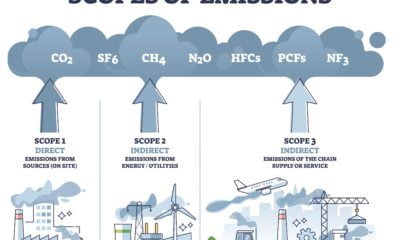

News
CDP: Japanese carmakers best prepared for stricter emissions regulation
Japanese automotive companies are the best prepared to deal with stricter emissions targets, according to a report from CDP. The organisation also warned investors that carmakers that fail to adapt to more stringent regulation are likely to see financial returns affected.
The report – No room for passengers: are auto manufacturers reducing emissions quickly enough? – ranks carmakers based on a number of different emissions-related areas, such as manufacturing emissions and advanced vehicles. The research aims to provide investors with comprehensive environmental data on the market and indicate strategic advantage within the industry.
Japanese companies rank highly, with Nissan topping the league, Toyota in second place and Mazda in fourth. French company Renault took the third spot. CDP explains that these companies rank highly due their leadership in fleet emissions reduction and advanced vehicles that include battery eclectic vehicles and plug-in hybrids.
The bottom of the table includes Hyundai and Tata Motors. General Motors and FCA also risk “significant penalties” in the EU and US, potentially equating to $1.7 billion (£1.1bn) and $574 million (£376m) respectively, CDP warns.
Despite fleet emissions being described as “hugely significant” the report also notes that some companies do not yet disclose this information or a business strategy to deal with regulation. These companies include Suzuki, Kia, Geely (the owners of Volvo), Mitsubishi, Fuji Heavy (owner of Sabaru) and Tesla.
Paul Dickinson, executive chairman of CDP, commented, “Whilst there is much debate about the implications of the current low oil price, this report shows that as regulation tightens some companies risk high financial penalties.
“These companies’ shares are held in the portfolios of the world’s largest institutional investors and the way they approach regulation and investment in future technologies will affect financial performance.”
He continued the research could better inform investment decisions and enable investors to engage with companies on the issues relating to tougher regulation and reducing emissions. Separate research, published last year, warned that seven carmakers were set to miss EU carbon reduction targets with a deadline of 2021 meaning they could face substantial fines, impacting on investors.
In the EU cars are responsible for around an eighth of carbon dioxide emissions. The figure highlights the need for stricter regulations if the bloc is going to meet climate change targets and avoid dangerous impacts.
Dickinson added, “The top ranking auto firms are investing in greater engine efficiency and exciting new electric and hybrid vehicle ranges which will help increase sales, help meet emissions targets and create cleaner air for us all.”
Photo: firemedic58 via Flickr
Further reading:
Seven carmakers set to miss EU emissions target
Tesla shares soar as Morgan Stanley predicts carmaker will ‘disrupt’ energy storage sector
‘Energetically sustainable’ wind power can provide surplus clean electricity
Car industry calls for standardisation for London’s ultra-low emission zone


 Environment12 months ago
Environment12 months agoAre Polymer Banknotes: an Eco-Friendly Trend or a Groundswell?

 Features11 months ago
Features11 months agoEco-Friendly Cryptocurrencies: Sustainable Investment Choices

 Features12 months ago
Features12 months agoEco-Friendly Crypto Traders Must Find the Right Exchange

 Energy11 months ago
Energy11 months agoThe Growing Role of Solar Panels in Ireland’s Energy Future



























